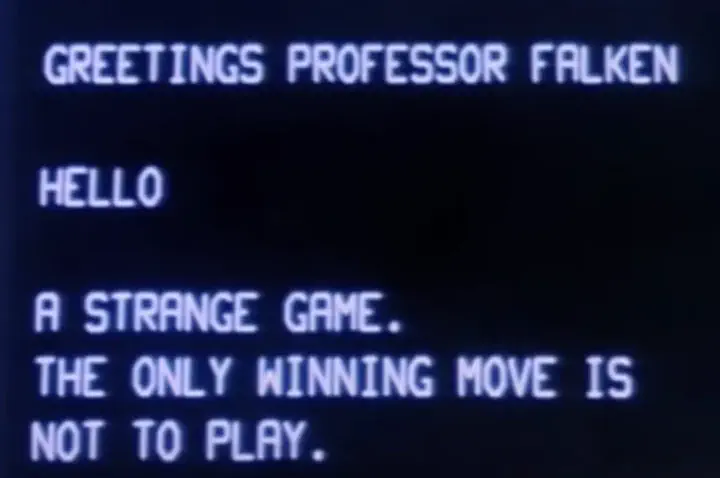Game theory and “Stand your ground”
 The only way to win is not to play. From the 1983 film War Games.
The only way to win is not to play. From the 1983 film War Games.When it’s best to attack first
During the Cold War, before the day of the ABM treaty, the situation between the United States and the Soviet Union was extremely dangerous, as each country was coming close to acquiring what was called “First strike capability”. If you had first strike capability it meant that you could launch a surprise “first strike” on the enemy which would be so devastating that they could do little harm to you in retaliating. If the your enemy had first strike capability, that would mean that they could launch a surprise attack against you that would be so devastating that you could not effectively retaliate.
So let’s consider Sam and Joe. They don’t get along. And there is no sheriff in town. There is no outside force to keep the peace between them. Joe thinks that Sam is developing first strike capability. That is, Joe thinks that Sam is powerful enough to ambush and kill Joe without Sam having to suffer much. Meanwhile, Sam is thinking the same thing about Joe. Sam is worried that Joe could kill Sam without having to face any serious consequences. Sam is afraid that Joe might attack first.
Joe is a pretty scary guy. So Sam has to wonder whether it would be better for him, Sam, to attack Joe before Joe attacks Sam. Now Joe isn’t stupid. He realizes that Sam might be thinking along those lines. So even if Joe wasn’t initially planning to attack first; he, Joe, now has real reason to worry that Sam will attack first. Now that Joe has some real reason to suspect that Sam might attack first, Joe now has a real reason to attack first. After all, if Sam might attack first, then they only way for Joe to stay safe is for Joe to attack Sam first.
Sam isn’t stupid either. Sam realizes that the situation gives Joe some real reasons to attack first. So Sam gets even more jumpy. This goes round and round so even a small conflict leads to a situation where the safest thing for both Sam and Joe is to try to attack the other first. This is extremely dangerous. It is unstable because what might start out as an irrational fear of the other spirals into perfectly rational fear that the other will attack first, for which the only defense is to launch the first, devastating strike.
This dynamic should also be familiar to anyone who’s watched the Treasure of the Sierra Madres.
Bring in the sheriff
Now let’s put a sheriff in town. If Joe goes out and kills Sam, Joe will be severely punished. If Sam goes out and kills Joe, Sam will be severely punished. Furthermore both Sam and Joe know this. Because Sam knows that Joe will be severely punished for killing Sam, Sam doesn’t have to worry so much about what Joe might do. Joe knows that Sam doesn’t have to worry so much, so Joe doesn’t have to worry so much about Sam launching a preemptive attack.
Stand Your Ground
Now let’s take a different story. Sam and Joe live in a state with a “Stand Your Ground” law. They both know the law. Sam looks like a scary dude to Joe, and Joe starts following Sam to see what Sam might be up to. Maybe Joe wants to catch Sam in the act of something. Maybe Sam really is a scary dude.
Sam notices that Joe is following him. Sam is worried. He doesn’t know what Joe is up to. Maybe Sam notices that Joe has a gun. So Sam figures that Joe, with a gun, is stalking him and figures that his best chance at surviving the night would be to jump Joe before Joe can shoot.
Or maybe Sam doesn’t know about the gun, but has shouted, threateningly, to Joe to back off. Sam might just try to stand his ground and try to scare Joe away. Joe now has real reasons to be afraid of Sam. And of course now Sam has a real reason to be afraid of Joe. Each at this point can legitimately fear that the other will try to kill the other first. So maybe Sam now attacks Joe, hoping to kill or injure him enough before Joe can use his gun. Sam fails. Joe uses his gun. Whoever succeeds in killing or incapacitating the other will not be punished. So both Sam and Joe are fighting for their lives with no outside constraints. Someone is going to die.
Even if the law would have applied the same
Sam dies; Joe survives. Even if we were to believe that the law would have treated Sam the same way it treated Joe had Sam been the victor, the entire dynamic of Stand Your Ground means that even a small amount of fear (merited or not) can quickly escalate into very legitimate fear in which the rational course of action for each party is to do is to try to kill the other guy before he kills you. The only way to win is not to play
The only way out of this dynamic is to return to the law that says that you can only fight back if you have no other choice. If you fight back when you could have run away, then you will go to jail. When both Sam and Joe Stand Their Ground, someone dies.